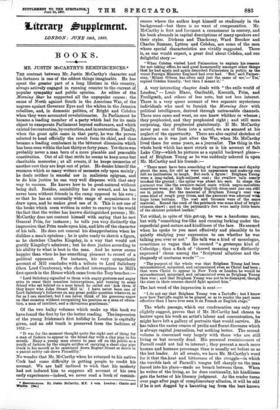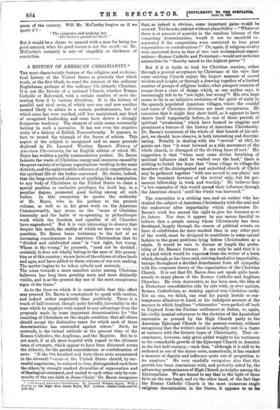BOOKS.
MR. JUSTIN McCARTHY'S REMINISCENCES.* TICE contrast between Mr. Justin McCarthy's character and his fortunes is one of the oddest things imaginable. He has spent the greater part of a long lifetime in this country, always actively engaged in running counter to the current of
popular sympathy and public opinion. As editor of the Mowing Star he supported all the unpopular causes : the cause of North against South in the American War, of the
negroes against Governor Eyre and the whites in the Jamaica rebellion, and, in domestic politics, of Bright and Cobden when they were accounted revolutionaries. In Parliament he became a leading member of a party which had for its main object to exasperate Parliament beyond endurance, and which existed for contention, by contention, and in contention. Finally, when the great split came in that party, he was the person selected to head officially the revolt from its chief, and thus became a leading combatant in the bitterest dissension which has been seen within the last thirtyor forty years. Yet there was probably never a man born of a more placable and peaceable constitution. Out of all that strife he seems to keep none but charitable memories ; at all events, if he keeps memories of another sort they are kept out of print. He denies himself the resource which so many writers of memoirs rely upon mainly ; he deals neither in scandal nor in malicious epigram, and to do him justice he can very well dispense with that easy way to success. He knows how to be good-natured without being dull. Besides, amiability has its reward, and ha has never been without friends in the camp opposed to his own ; so that he has an unusually wide range of acquaintance to draw upon, and he makes good use of it. This is not one of the books which seem written in order to convey to the world the fact that the writer has known distinguished persons ; Mr.
McCarthy does not content himself with saying that he met General Prim, for instance ; he tells you very distinctly the impression that Prim made upon him, and hits off the character of his talk. He does not conceal his disapprobation when he dislikes a man's opinions ; he is quite ready to sketch a figure, as he sketches Charles Kingsley, in a way that would not gratify Kingsley's admirers ; but he does justice according to his ability to what is best in the man. And he never seems happier than when he has something pleasant to record of a political opponent. For instance, his very sympathetic account of Mill concludes with a tribute to Lord Salisbury (then Lord Cranborne), who checked interruptions to Mill's first speech in the House which came from the Tory benches :- " Lord Salisbury signalled to them with angry gestures and angry cries to cease their senseless interruptions, and turning to some friend who sat behind on a near bench he called out Ask them if they know who John Stuart Mill is.' I have never been one of Lord Salisbury's followers on any great public question whatever, so far as I can recollect, but I can never think of his generous anger of that occasion without recognising his position as a man of educa- tion, a man of intellect, and a chivalrous gentleman."
Of the two bulky volumes which make up this book we have found the first by far the better reading. The impression of the young Irishman's first holiday in London is capitally given, and an odd touch is preserved from the fashions of 1852 :— " It was for the moment thought quite the right sort of thing for a man of fashion to appear in the broad day with a clay pipe in his mouth. Many a young man strove to pass off on the public as a youth of fashion by the simple artifice of carrying a short clay pipe stuck in his mouth as he sauntered down Regent Street or drove in a patent safety cab down Piccadilly."
No wonder that Mr. McCarthy when he returned to his native Cork had some difficulty in getting people to credit his account. We are half inclined to wish that his modesty had not induced him to suppress all account of his own early experiences—indeed, we never read a book of reminis-
• Baminkicencee. By. Justin McCarthy, M.P. 2 vols. London : Chatto and Windna. [2484
cences where the author kept himself so studiously in the background—but there is no want of compensation. Mr. McCarthy is first and foremost a connoisseur in oratory, and his book abounds in capital descriptions of many speakers and their styles. Dickens and Thackeray, Ward Beecher and Charles Sumner, Lytton and Cobden, are some of the men whose special characteristics are vividly suggested. There is, as one would expect, a great deal about Cobden, and one delightful story "When Cobden visited Lord Palmerston to explain his reasons for not taking office, he said good humouredly amongst other things that he had again and again described Palmerston in public as the worst Foreign Minister England had ever had. But, said Palmer- ston, Milner Gibson has often said just the same of me.'—' Yes,' replied Cobden blandly, but then I meant it " A very interesting chapter deals with " the exile world of London," — Louis Blanc, Garibaldi, Kossuth, Prim, and Freiligrath, and others of less note, but not less interest.
There is a very queer account of two separate mysterious individuals who used to furnish the Morning Star with political intelligence, derived through untraceable channels.
These men came and went, no one knew whither or whence ; they prophesied, and they prophesied right ; and still more surprising, they prophesied gratuitously. If Mr. McCarthy never put one of them into a novel, we are amazed at his neglect of the opportunity. There are also capital sketches of America as it was just after the War, when Mr. McCarthy
lived there for some years, as a journalist. The thing in the whole book which has most struck us is his account of Salt Lake City—which he pictures as a squalid backward place—
and of Brigham Young as he was suddenly ushered in upon Mr. McCarthy and his friends :-
" These must have been something of impressiveness and dignity about the man, for odd as were his appearance and make-up one felt no inclination to laugh. But such a figure I Brigham Young wore a long-tailed, high-collared coat ; the swallow tails nearly touched the ground ; the collar was about his ears. In shape the garment was like the swallow-tailed coats which negro-melodiets sometimes wear, or like the dandy English dress-coat one can still see in prints. But the material of Brigham Young's coat was some kind of rough grey frieze, and the garment was adorned with huge brass buttons. The vest and trousers were of the same material. Round the neck of the patriarch was some kind of bright crimson shawl ; and on the patriarch's feet were natty little boots of the shiniest polished leather."
Yet withal, in spite of this get-up, he was a handsome man, but with "something fox-like and cunning lurking under the superficial good-nature and kindliness of the face. He seemed when he spoke to you most effusively and plausibly to be quietly studying your expression to see whether he was talking you over or not." His talk was a kind of monologue, sometimes so vague that he seemed " a grotesque kind of Coleridge ; then a flash of ' shrewd meaning very distinctly expressed' shone among the `Scriptural allusions and the rhapsody of unctuous words " :— "The purport of the whole was that Brigham Young had been misunderstood, misprized, and calumniated even as Christ had been ; that were Christ to appear in New York or London he would be misunderstood, misprized, and calumniated even as Brigham Young then was ; and that Brigham Young was not to be dismayed, though the stars in their courses should fight against him."
The last word of the impression is neat :- " I do not say that Brigham Young was a Tartuffe ; but I know now how Tartaffe ought to be played so as to render the part more effective than I have ever seen it on French or English stage."
The whole passage, which our condensation can only very slightly suggest, proves that if Mr. McCarthy had chosen to bestow upon his work an artist's labour and concentration, he might have left a gallery of portraits that would survive. He has taken the easier course of prolix and fluent discourse which is always capital journalism, but nothing better. The second volume is concerned very largely with those who are still living or but recently dead. His personal reminiscences of Parnell could not fail to interest ; they present a much more human and humane personage than is usually set before us as the lost leader. At all events, we have Mr. McCarthy's word for it that theleat and bitterness of the struggle—in which the terrible lash of Parnell's tongue fell sharply on the man forced into his place—made no breach between them. When he writes of the living, as he does continually, his kindliness gets the better of his literary judgment. As the reader turns over page after page of complimentary allusion, it will be odd if he is not dogged by a haunting tag from the best known poem of the century. Will Mr. McCarthy forgive us if we quote it 7— " The carpenter said nothing but The butter's spread tea thick.'"
But it would be a shame to quarrel with a man for being too good-natured, when his good-nature is not the result—as Mr. McCarthy's certainly is not—of stupidity or slackness of conviction.



















































 Previous page
Previous page